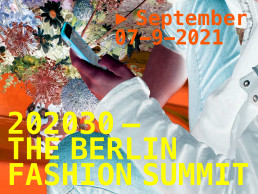

The 2020s are expected to become the decade of glocal change-making – now is the chance to transform outdated systems by taking the opportunity of combining a recovery from the disturbing pandemic with all the benefits of sustainable development.
In that regard – and as the best ideas come from a constructive exchange – the cooperation partners studio MM04, Sqetch & Beneficial Design Institute conceptualized another online format for the second edition of 202030 – The Berlin Fashion Summit that took place at the end of August as well as for three public days in early September 7th to 9th, 2021.
With the aim to encourage actions that are genuinely able to create a positive impact on society, the environment and the fashion industry itself, we welcomed people from all over the world to participate in our workshops and to watch the panel talks, keynotes, interviews and presentations all revolving around the topic:
ECOSYSTEMS – How to implement positive impact?
Top-class speakers from various disciplines such as British fashion researcher Prof. Dr. Kate Fletcher, Clare Press (Wardrobe Crisis Podcast / Vogue Australia), futurologist Matthias Horx, Cecilie Thorsmark (Copenhagen Fashion Week) or dematerialization champion Amber Jae Slooten (The Fabricant) were conducted by a selective list of industry experts, and due to that, provided valuable insights for more than 2000 registered participants from nearly 50 different countries during the Berlin Fashion Week.
The edition highlighted ecosystems as a livelihood, base and inspiration to foster life quality and holistic, agile and anti-fragile future-warded solutions for fashion. The focus was set on relationships and interactions, as to be found in the local Berlin ecosystem that presents itself as a co-creation lab and innovation network par excellence.
We are very pleased with the positive feedback from the audience as well as with the results of the preliminary Pop Up Thin Tank held to rethink fashion ecosystems as well as to define & measure their potential positive impact on people and planet.
These are some of the conclusions to take-away from the expert debates in order to support successful transformation within the fashion industry:
We need immediate circular transformation, that is beneficial and accessible to everyone. We need to promote best circular practice and openly share our tools, implementing transparency and traceability.
– Taking responsibility has to become rewarding – making circular practice profitable for everyone. We must support direct investments in impactful circular, beneficial solutions & innovations and “put a price tag on ecological damage and resource depletion.”
“One of the hallmarks we have seen in fashion and sustainability movements over the last thirty years has been an attempt to deflect responsibility from one group onto another.”
(Prof. Dr. Kate Fletcher)
– Therefore, we need a legal adaptation towards circularity with new laws and standards fostering positive impact and equal chances while ensuring a just transition by specifying industry bounds, providing tax cuts and subsidising best practice – through an aligned legislation that defines measurable circularity and sustainability claims.
“If we understand, that not only the moulds of production have caused problems, but also the order of national economies and the logic of markets, then it's not enough to talk about a sustainable textile and fashion economy. It's about redesigning markets, economies and social contexts.”
(Prof. Dr. Sebastian Sierra-Barra)
– It is crucial to support the cultural change, a change of mindset, that makes circularity something to aim for, “to be the new cool”. Positive Impact needs to become a common and holistic understanding, thinking and acting, deeply embedded in our society.
“I would keep it short and say that, actually, the biggest drive for change would be (…) start by educating people.”
(Daniel Pinto)
In summary, we can say, that a shift towards a sustainable future has to be supported by all sectors of the industry, meaning that we have to work together towards a common goal. To do so we need to clearly define measurements, standards and regulations, on a societal and legislative level. Furthermore, it is crucial to educate the consumer, producer and supplier, to give sustainability and circularity a new stand within our society. Only through an informed society we can ensure a lasting change in the fashion and textile industry towards a sustainable and circular future.
The Summit came to an end for now, yet we are ready to prepare the next edition soon and for so long, summarized all available materials and resources to make sure you won’t be left out on the discussion! Enjoy and stay tuned for 2022!
Enjoy and stay tuned for 2022!
Pop Up Think Tank – Workshops
The Pop Up Think Tank took place as a prelude to the 202030 Summit. The three main thematic focus fields of the Summit were explored and supported in three equivalent expert workshops led by Sqetch and Benefical Design Institute, which were not available to the general public and served as an open space for professionals to prepare quality content and clear messages for the public Summit. Big thanks to all attendees and especially to the students of the AMD Academy master program ‘Sustainability in Fashion and Creative Industries’ Isabella Rhein and Sarah Guggenbühl as well as Anabelle Grundmann for their contributions.
Find the results in the recaps below:
Workshop #1 Circular Systems – How to implement positive impact
Download the presentation here.
Workshop #2 Local Ecosystems – How to organize positive impact
Download the presentation here.
Workshop #3 Valuation Systems – How to define quality and measure impact
Download the presentation here.
The 202030 Summit
Eventually, the Summit served as the main professional public stage of the 202030 Summit and aimed to open up the dialogue to a broader (industry) audience by offering compact constructive inputs and insights. It was divided in the same three topic days – to dive in deeper below:
Day #1 Circular Systems – How to think and design positive impact?
Magdalena Schaffrin and Max Gilgenmann from studio MM04 opened the Summit with a warm welcome, followed by Prof. Dr. Sebastian Sierra-Barra from the University of Applied Sciences Berlin inspiring the audience with his keynote “Fashion and the anthropocene”. Another highlight of the first day was the interview with the sustainable fashion pioneer Prof. Kate Fletcher from the Centre for Sustainable Fashion, London who pointed out the question “What does the earth need fashion to do?”. In the first panel discussion, Matthias Fuchs from OceanSafe, Prof. Dr. Melanie Jaeger-Erben from TU Berlin, Lavinia Muth from Armedangels and Daniel Magunje from Lablaco debated on “the potential of positive impact through circular fashion systems”. After the tea break, Matthias Horx from the Zukunftsinstitut GmbH gave the audience an outlook to the future saying that “Good design in a broader sense, not only the surface design, would also work everywhere in the world. Because of the scale of the connectivity, of the dialogue between humans and nature is universal”. In addition, this Summit edition included a new “collaboration talks” format where professionals collaborated successfully on circular fashion systems and shared their experiences and learnings.
Day #2 Local Ecosystems – How to organize and foster positive impact?
Orsola de Castro from Fashion Revolution started the day with her keynote “Local culture – glocal impact” emphasizing the key measure for resilient fashion systems is to strengthen local ecosystems. Following that, Christine Henseling from the Institute for Future Studies and Technology Assessment showcased in her presentation “Circular city Berlin” how circularity works in Berlin. And what is the power of local ecosystems? This question discussed Afra Gloria Müller from Send e.V, Arianna Nicoletti from Circular Berlin, Prof. Günter Faltin from Stiftung Entrepreneurship, Leon Reiner from Impact Hub Berlin together with Max Gilgenmann from studio MM04. How local ecosystems can be organized and fostered was presented with an ecosystem map of Berlin as a result of the Pop Up Think Tank that was curated by Prof. Friederike von Wedel-Parlow from the Beneficial Design Institute and Sqetch CEO Marte Hentschel.
“We can actually drive change, out there in the industry, and that´s a new role for the Fashion Week”
(Cecilie Thorsmark, Copenhagen Fashion Week)
Day #3 Valuation Systems – How to define quality and measure impact?
The third and last day of 202030 – The Berlin Fashion Summit was all about valuation systems and focused on the definition of quality and tools to measure true impact.
Kim Scholze from Sympatex opened the last Summit day with her Keynote “Chemistry of fashion – quality and impact” and claimed that “There will be a new blue ocean, and this is sustainability”. Next, Geraldine de Bastion from the Global Innovation Gathering interviewed Prof. Dr. Michael Braungart from EPEA – Internationale Umweltforschung to find answers to “How to value and measure true quality?”. The first panel of the day dealt with the question: how can we agree on fashion impact criteria? It was discussed with Alexander Nolte from Stop! Micro Waste, Dr. Max Marwede from Frauenhofer IZM, Nora Vehling from Fashion Revolution Germany, Varena Junge from Yook and moderated by Max Gilgenmann. Moreover, Magdalena Schaffrin interviewed Claudia Hofmann, founder of Claudia Hofmann Studio and co-founder of the Fashion Council Germany, about her take on “How to embrace true quality?”. Subsequently, after three successful Summit days, we closed the event with a heartful “Goodbye and see you in spring!”
Stay tuned for the next edition:
Visit the 202030 – The Berlin Fashion Summit websiteto have access to all the news and resources regarding the latest and upcoming edition of the Summit.
Subscribe to the 202030 Summit Newsletterhere to be aware of all of the upcoming events.
The third edition will take place in early 2022, the exact date will be announced soon.
Follow the event:
202030 – The Berlin Fashion Summit is organized by studio MM04 in cooperation with Sqetch and the Beneficial Design Institute. Funded by the Senate Department for Economics, Energy and Public Enterprises Berlin. Partner der Berliner Fashion Week.
202030 – The Berlin Fashion Summit #2 ECOSYSTEMS – How to implement Positive Impact
202030 - The Berlin Fashion Summit is a cross-disciplinary platform that offers a virtual space where avant-garde creatives and critical grassroots protagonists meet industry stakeholders for constructive critical debates on the sustainability-trendsetting future of fashion. The aim of the 202030 Summit is to bridge the gap between existing innovations with the industry’s need for pragmatic transformation guidelines and to envision tangible alliances for redesigned value chains and adequate solutions for complex fashion industries, consumer cultures and the tech movement, in a joint mission.
